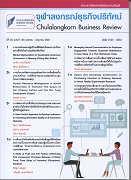Managing Internal Communication for Employee Engagement Towards Customer Satisfaction: A Case Study of a Thai Restaurant Chain
Main Article Content
Abstract
Abstract
This qualitative research investigates how employee engagement towards customer satisfaction can be driven through internal communication at a Thai restaurant chain. The study delves into mechanisms the company uses to internally communicate customer-centered issues to its members, how internal communication brings customer-focused employee engagement to the firm, and the approaches to overcome potential barriers to internal communication. Data collecting methods mainly consist of in-depth interviews with five top executives and four focus-group discussions with five employees in each group. With qualitative data analysis, results show that the indispensable off-line communication formats include the highest-ranking executive’s being good role model of customer-satisfaction enthusiast, training center, mobile teaching, and informal face-to-face meeting while e-mail and Line application are on-line channels particularly working for management-level employees. To drive employee engagement in customer-centered activities and overcome internal communication barriers, the firm exploits communication mechanisms and tactics, including implementing Kaizen projects and Im-Jai group meetings as two-way communication, delivering clear and easy-to-understand messages to employees, and making contents truly audience-oriented by applying the WIIFM concept. The communication framework proposed in this study suggests research potentials for communication and organization disciplines and can be used as a guideline by corporate communicators for designing internal communication strategies to drive employee engagement in any business-related concerns.
Article Details
Opinions and discussions in papers published by the Creative Business and Sustainability Journal (CBSJ) are deemed as personal opinions and the responsibility of the writers. They are not the opinions or responsibility of the Chulalongkorn Business School of Chulalongkorn University.
Papers, content, information etc. appearing in the Journal are deemed to be the copyright property of the Chulalongkorn Business School of Chulalongkorn University. Anybody or any organization that wishes to publish any part of them or use them in any way must obtain written permission from the Chulalongkorn Business School, Chulalongkorn University.


